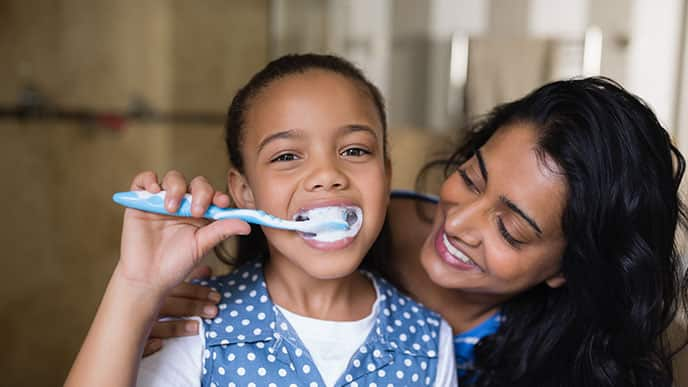What is Teething?
Teething is a natural process in a baby's development. The first set of teeth, primary or baby teeth, break through the gums and become visible in the mouth. This process occurs gradually, with teeth emerging one by one. During teething, the movement of the teeth beneath the gums can cause the gum tissue to become swollen and tender. This can lead to discomfort for the baby, often resulting in symptoms such as irritability, excessive drooling, and a desire to chew on objects.
The primary teeth that emerge during teething include incisors, canines, and molars. These teeth play crucial roles in a child's ability to eat solid foods, speak clearly, and maintain space for the eventual emergence of permanent teeth. While teething is a normal and necessary part of a baby's growth, it can be challenging for both infants and parents due to the discomfort it may cause. Understanding this process can help carers better support their babies during this important developmental stage.
When do Babies Start Teething?
The timing of teething can vary significantly from one baby to another. According to the Indian Dental Association (IDA), there's no exact age when teething begins. Most babies start the process during their first year of life, and typically, the first teeth emerge at about six months of age. However, it's important to note that this is just an average range. Some babies may start teething as early as three months old, while others might not see their first tooth until after their first birthday. The order in which teeth appear can also differ, but generally:
Lower central incisors (bottom front teeth) often come in first
Upper central incisors usually follow
Lateral incisors, first molars, canines, and second molars tend to appear in that order.
It's worth remembering that every baby is unique. Some may have several teeth appear quickly, while others might experience longer gaps between each new tooth. While teething can cause discomfort, to support your baby's oral health during this time, it's important to start brushing their teeth as soon as they appear. For instance, using a soft-bristled toothbrush like the Colgate Toothbrush for Kids (0-2 years) can be effective. Its extra-soft bristles gently clean the teeth and gums, while its small head allows easy access to your child's mouth, ensuring proper oral hygiene as they begin this milestone.
Give your child's teeth that extra care with an ultra-soft bristled toothbrush!
Teething Symptoms
Teething is a normal part of a baby's development but can be uncomfortable. Here are some common baby teething symptoms and signs to watch out for:
Increased drooling occurs as saliva production can increase when teeth begin to erupt.
Gum discomfort may appear as red, swollen, or tender gums.
Irritability can manifest as fussiness or crankiness due to discomfort.
Increase in chewing behaviour, as babies may chew on their hands, toys, or anything in reach.
Difficulty sleeping can arise as teething discomfort disrupts sleep patterns.
Reduced appetite is common, as some babies may eat less due to gum soreness.
A low-grade fever, or slight temperature rise, is sometimes associated with teething.
It's important to note that severe symptoms of teething, like high fever, diarrhoea, or vomiting, are not typically associated with teething and may indicate other health issues. Always consult your paediatrician if you're concerned about your baby's symptoms.
How to Soothe a Teething Baby
Soothe a teething baby by providing emotional comfort and physical relief. If you're wondering how to soothe baby teething, there are several methods to help. Typically, every baby starts teething between 4 to 7 months, and during this period, they may experience irritability, excessive drooling, and discomfort. Here are some baby teething remedies for pain relief:
Create a Calm Environment: Use soft music, gentle rocking, or white noise to help soothe your baby and create a relaxing atmosphere.
Provide Emotional Support: Cuddle and hold your baby for comfort and reassurance. Your presence and affection can help alleviate their distress.
Distract and Engage: Engage your baby with interactive toys, songs, or gentle play to shift their focus from teething discomfort.
Offer Teething Toys: Provide solid, non-liquid teething toys that can be chilled in the refrigerator. Cold items can numb sore gums and provide relief.
Gentle Gum Massage: Clean your hands and gently rub your baby's gums with your finger to provide comfort and pressure.
Natural Remedies For Teething
Utilise natural items and practices to alleviate teething discomfort. Here are some safe and effective home remedies for teething babies:
Chilled Fruits: For babies eating solids, chilled fruits like bananas or apples can be soothing. Use a mesh feeder to prevent choking.
Cold Washcloth: Soak a clean washcloth in water, freeze it briefly, and let your baby chew on it. The cold texture can soothe irritated gums.
Herbal Teas: If your baby is older than six months, you can offer small amounts of chamomile or fennel tea to help soothe their gums. The herbal tea should be cooled to a safe temperature for the baby.
Massage: Rubbing your baby's gums with a clean finger can help relieve discomfort. This method allows you to apply gentle pressure directly where it hurts.
Breastfeeding: For breastfed babies, nursing can be comforting during teething.
Always consult with your paediatrician before trying any new remedies or if you have concerns about your children's health.
Teething Remedies to Avoid
While seeking relief for your teething baby, it's crucial to be aware of potentially harmful remedies. Here are teething remedies for babies you should avoid due to safety concerns:
Teething Gels and Medications: Over-the-counter teething gels containing benzocaine or lidocaine, homeopathic teething tablets, and adult medications are not recommended for infants, as they can cause serious side effects.
Teething Jewellery: Amber necklaces or other teething jewellery pose choking hazards and strangulation risks and should not be used.
Frozen Teething Rings: Avoid freezing teething rings, as they can become too hard and may injure your baby's mouth and gums. Instead, chill them in the refrigerator only.
When to See a Dental Professional?
While teething is a normal process, there are times when professional dental care may be necessary. Consult a dental professional, rather than depending on baby teething remedies, if you notice any of the following signs in your teething baby:
High Fever: If your baby has a fever that persists, it may indicate an illness unrelated to teething.
Severe Irritability: If your baby is excessively fussy and inconsolable, it may be worth discussing with a paediatrician.
Diarrhoea or Rash: While mild drooling and irritability are common, diarrhoea or rashes that do not resolve may require medical attention.
Delayed Dental Development: If your baby has not started teething by 12 months, it's advisable to consult a dentist for an evaluation.
Teething can be challenging for babies and parents, but with the right strategies and support, you can help your little one through this phase. Remember to provide comfort, try baby teething remedies, and avoid potentially harmful products when they start showing signs of teething. Every baby is different, and what works for one may not work for another. Be patient, try other methods, and do not hesitate to seek help from a healthcare professional if you have concerns about your baby's oral health or development.
Frequently Asked Questions
What is a quick remedy for teething in babies?
One of the quick teething remedies for babies is to offer a cold teething toy or a chilled washcloth for them to chew on. Cold items help numb sore gums and provide relief. You can also gently massage your baby's gums with a clean finger.
How painful is teething for babies?
Teething can be painful for babies, causing discomfort as teeth push through the gums. Teething problems in babies can be identified through symptoms like swollen gums, fussiness, drooling, and a desire to chew on objects. While some babies experience only mild irritability, others may have significant pain that disrupts sleep and feeding. Consult a dental professional or paediatrician if the pain persists.
Do babies sleep more when teething?
Teething does not increase sleep in babies. Many infants sleep less due to discomfort, having trouble falling asleep, or waking more often. Some may seem tired from dealing with pain, but this doesn't always mean more sleep. Each baby reacts differently. Maintaining routines and using soothing techniques can help manage sleep disruptions during teething.
What medicine is good for teething babies?
For teething pain, always consult your paediatrician before using any medication. Infant-specific pain relievers may be recommended, with dosages based on your baby's weight. Avoid numbing gels due to potential side effects. Natural remedies like cold teething rings or gum massage can complement baby teething medicine. Never give adult pain relievers to babies. Your paediatrician can provide personalised recommendations for your baby's needs.
This article is intended to promote understanding of and knowledge about general oral health topics. It is not intended to be a substitute for professional advice, diagnosis or treatment. Always seek the advice of your dentist or other qualified healthcare provider with any questions you may have regarding a medical condition or treatment.
ORAL HEALTH QUIZ
What's behind your smile?
Take our Oral Health assessment to get the most from your oral care routine
ORAL HEALTH QUIZ
What's behind your smile?
Take our Oral Health assessment to get the most from your oral care routine








.jpg)




